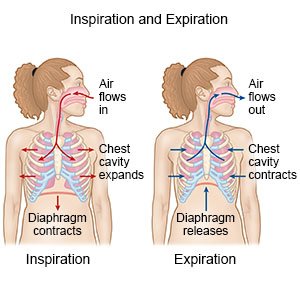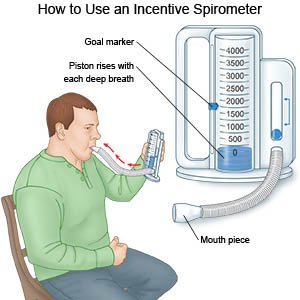Atelectasis
Medically reviewed by Drugs.com. Last updated on Jun 5, 2024.
Atelectasis is a condition that happens when the alveoli in your lungs cannot expand fully. This may cause part or all of your lung to collapse. Alveoli are tiny air sacs in your lungs that exchange gases and help put oxygen into your blood. The exchange of oxygen and carbon dioxide cannot take place in the alveoli when your lung collapses. Atelectasis may last for days. It may be caused by not being able to take a deep breath due to blocked airways or surgery. It may also be due to disease, infection, or trauma.
 |
WHILE YOU ARE HERE:
Informed consent
is a legal document that explains the tests, treatments, or procedures that you may need. Informed consent means you understand what will be done and can make decisions about what you want. You give your permission when you sign the consent form. You can have someone sign this form for you if you are not able to sign it. You have the right to understand your medical care in words you know. Before you sign the consent form, understand the risks and benefits of what will be done. Make sure all your questions are answered.
Medicines:
Depending on the cause, you may receive any of the following:
- Bronchodilators help open your airway to make breathing easier.
- Mucolytics help thin mucus so it is easier to cough out.
- Antibiotics help treat or prevent an infection caused by bacteria.
- Pain medicine may be given if your pain prevents you from breathing deeply. Pain control will allow you to cough and breathe deeply. Do not wait until the pain is severe before you ask for more medicine.
Tests:
- A chest CT or MRI may be done to help find the cause of your atelectasis. You may be given contrast liquid to help your lungs show up better. Tell your provider if you have ever had an allergic reaction to contrast liquid. Do not enter the MRI room with anything metal. Metal can cause serious injury. Tell the healthcare provider if you have any metal in or on your body.
- Pulmonary functions tests (PFTs) measure how well your lungs work. PFTs may show the cause of breathing problems or how well treatments for a lung condition are working.
- A bronchoscopy may help diagnose lung diseases, inflammation, cancer, or infections. A bronchoscope (thin tube with a light) is inserted into your mouth and moved down your throat to your lungs.
Treatment:
Depending on the cause, you may receive any of the following:
- Humidified oxygen may be needed to loosen mucus and help raise your blood oxygen level.
- Positive airway pressure uses air pressure to keep your airways open. This may be used as a mask over your mouth or your nose.
- A ventilator may be used if you have severe breathing problems. A ventilator is a machine that gives you oxygen and breathes for you when you cannot breathe well on your own. An endotracheal (ET) tube is put into your mouth or nose and attached to the ventilator.
- Surgery or radiation may be done to remove or shrink tumors that may be blocking your airways.
Change your position often
to help expand your lungs. Sit on the side of the bed or walk after surgery as directed. Your healthcare provider may ask you to lie or sit in certain positions to help drain mucus. This is called postural drainage.
Use chest percussion
to help move the mucus out of your lungs. Chest percussion is gentle clapping on your back or side. Chest percussion is sometimes used with postural drainage. Ask your provider for more information about postural drainage and chest percussion.
Incentive spirometry
helps you take slow, deep breaths to expand and fill your lungs with air. Put the plastic piece in your mouth and take a slow, deep breath. Then let the air out and cough. Repeat these steps as directed.
 |
RISKS:
Atelectasis can be life-threatening if not treated. Atelectasis can cause pneumonia. Atelectasis can become a long-term issue and prevent your airways from clearing mucus. This can cause repeat infections or respiratory failure.
CARE AGREEMENT:
You have the right to help plan your care. Learn about your health condition and how it may be treated. Discuss treatment options with your healthcare providers to decide what care you want to receive. You always have the right to refuse treatment.© Copyright Merative 2024 Information is for End User's use only and may not be sold, redistributed or otherwise used for commercial purposes.
The above information is an educational aid only. It is not intended as medical advice for individual conditions or treatments. Talk to your doctor, nurse or pharmacist before following any medical regimen to see if it is safe and effective for you.
Learn more about Atelectasis
Treatment options
Care guides
Further information
Always consult your healthcare provider to ensure the information displayed on this page applies to your personal circumstances.
